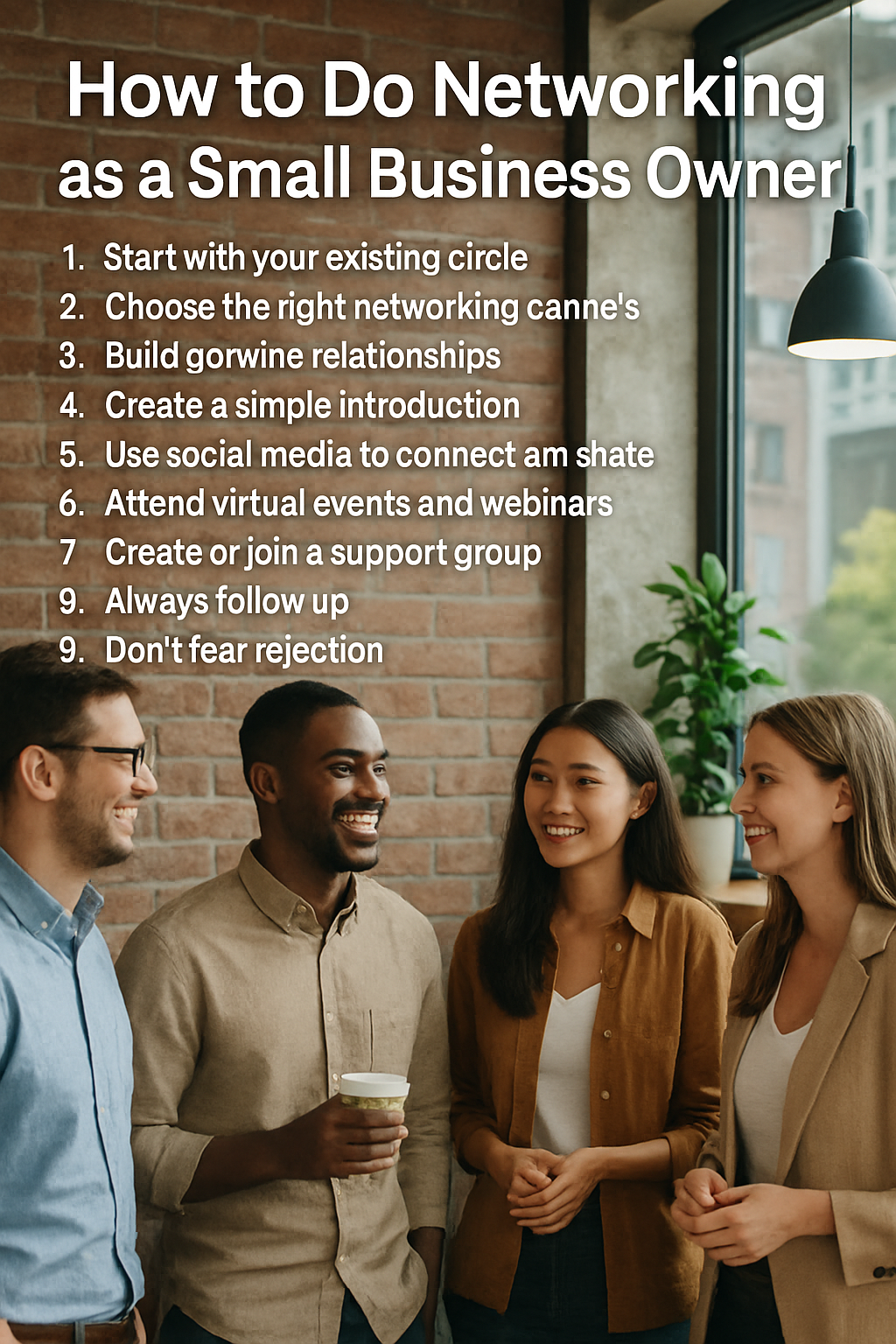When you’re starting a business, building relationships is just as important as building your product or service. Networking can open doors to new clients, mentors, collaborations, and growth opportunities—especially for small business owners. But if the idea of networking makes you uncomfortable or unsure where to start, don’t worry. This guide will help you approach networking in a natural, practical way that works even if you’re just beginning.
Why Networking Matters
Networking isn’t about handing out business cards or pitching your service at every opportunity. It’s about creating meaningful connections that can support your growth, professionally and personally.
Key benefits of networking:
- Learn from experienced entrepreneurs
- Gain referrals and new customers
- Discover opportunities for collaboration or investment
- Build a support system for tough times
- Get honest feedback on your business
Even a small, well-nurtured network can make a huge impact on your business journey.
1. Start with Your Existing Circle
You don’t need to attend conferences or high-level events right away. Start with the people you already know.
- Friends and family
- Former coworkers or classmates
- Local business owners in your neighborhood
- Social media connections
Let them know what you’re working on. They might offer advice, become customers, or connect you with someone useful.
Quick tip:
Don’t just say, “I started a business.” Instead, say, “I help people [solve a specific problem]. If you know someone who might benefit, I’d love an introduction!”
2. Choose the Right Networking Channels
Not every networking method works for every personality. Choose the ones that match your style and industry.
Online options:
- LinkedIn: Great for professional networking
- Instagram/Twitter: Good for creative or lifestyle brands
- Facebook Groups: Niche-focused and active
- Slack/Discord Communities: Tech and startup-friendly
- Reddit: Participate in relevant subreddits
Offline options:
- Local business meetups or workshops
- Chamber of Commerce events
- Community markets and fairs
- Coworking spaces
- Industry-specific conferences
Pick two or three to focus on so you don’t get overwhelmed.
3. Build Genuine Relationships
Networking is about value, not volume. Rather than trying to meet everyone, aim to deepen a few key relationships.
How to be memorable:
- Listen more than you talk
- Ask thoughtful questions
- Follow up within 48 hours after a meeting
- Offer help or resources without expecting immediate return
Think: “How can I help this person succeed?” That mindset will naturally attract the right people to you.
4. Create a Simple Introduction (Your “Pitch”)
When someone asks what you do, you need a clear, confident answer. Prepare a short, friendly version of your elevator pitch.
A good pitch includes:
- Who you help
- What problem you solve
- What makes you different
Example:
“I help busy parents eat healthier by delivering fresh, ready-made meals that save them time without sacrificing taste.”
Practice saying it naturally so it doesn’t feel forced.
5. Use Social Media to Connect and Share
Social media is one of the easiest tools for modern networking. Post consistently about your business, your journey, and your values.
What to share:
- Behind-the-scenes photos or videos
- Lessons you’re learning as an entrepreneur
- Questions to start conversations
- Success stories from clients or customers
Engage actively: Comment on others’ posts, reply to messages, and join discussions. It shows you’re invested.
6. Attend Virtual Events and Webinars
You don’t need to leave home to network effectively. Virtual events can be just as powerful—and often free.
Look for:
- Industry webinars
- Masterminds or Q&A sessions
- Instagram Lives or YouTube Live sessions
- Virtual co-working hours
Make the most of these events by participating in chats and connecting with speakers or attendees afterward.
7. Create or Join a Support Group
Small business ownership can feel lonely. Having a trusted circle of peers can be motivating and educational.
Start or join a group that:
- Meets regularly (monthly or weekly)
- Shares wins, challenges, and goals
- Provides feedback and accountability
- Is based on mutual respect and confidentiality
You can organize one yourself using WhatsApp, Zoom, or in-person meetings at a café or coworking space.
8. Always Follow Up
Meeting someone is just the beginning. Following up is what builds a relationship.
Follow-up checklist:
- Send a message or email within 1–2 days
- Mention something specific you talked about
- Add them on LinkedIn or another platform
- Stay in touch by commenting on their posts or sharing resources
If you promised to send something (a link, contact, or offer), do it. Reliability builds trust.
9. Don’t Fear Rejection
Not everyone will respond, and that’s okay. Networking is a numbers game with a human touch. Focus on the connections that do work and don’t take silence personally.
You’re building long-term relationships, not one-time sales.
10. Be Patient and Consistent
Like everything in business, networking takes time. You won’t see instant results—but over weeks and months, you’ll notice doors opening that wouldn’t have been possible without the right connections.
Final Thoughts: Networking Your Way
You don’t need to become an extrovert or attend flashy events to succeed at networking. Start small, be intentional, and prioritize genuine connections. With time, your network will become one of your most powerful business tools.
No matter where you are in your entrepreneurial journey, someone out there can help you—and you can help them. That’s the real power of networking.
